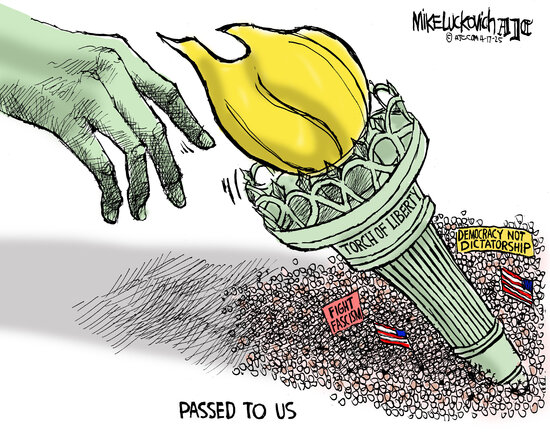The Federal Trade Commission is reviewing a merger between two giant advertising agencies, Omnicom and Interpublic. Normally, this deal be the sort of thing that wouldn’t generate a ton of attention outside of industry watchers. But we live in the Trump era—where every action by a federal agency is dictated by Donald Trump’s personal and political whims. So now, this merger might come with an absolutely wild and unconstitutional provision: The combined company cannot refuse to place a client’s ads based on media platforms’ political content.
The FTC frames this as preventing the ad agencies from “boycotting” platforms, but that’s stretching the legal definition of “boycott” beyond recognition. Companies are forbidden from colluding with each other to exclude competitors from their market, to fix prices, or to require the use of a particular provider. “Boycott” does not mean a company deciding not to do business with another company, but the FTC really, really wants it to mean that, so it can force advertisers to spend money on Truth Social, X, and whatever other Nazi hellholes pop up online.
The proposed order, already approved by the FTC commissioners, essentially allows the organization to control not just where Omnicom—the name of the merged company—places ads on behalf of companies working with them, but also to control which advertisers they choose to work with. The merged company also could not refuse to work with an advertiser because of their political or ideological viewpoints. So, when Stormfront comes knocking, gotta work with them. Terrific.

The company would also have to agree to file annual reports and additional reports anytime the FTC feels like asking. Then, the FTC will determine whether the company is in compliance. To do that, the FTC gets to demand access to all of Omnicom’s books, ledgers, accounts, correspondence, and anything else that the FTC wants, whenever they want, as long as they give the company five days notice. Oh, and the company has to pay for all copy costs for whatever the FTC wants copied. The FTC can also interview anyone at Omnicom.
In other words, this isn’t a one-time agreement that Omnicom just has to sign and implement, though that would be bad enough. It’s an agreement for ongoing oversight, and the government gets to choose their clients and social media platforms. It bears a striking resemblance to the “deals” Trump made with major law firms, which appear to grant the administration control over which clients the firm chooses to work with. This will probably work out just as well for Omnicom as it did for those law firms, which are now bleeding clients and losing top attorneys.
This move is no doubt designed in part to force private companies to advertise on Truth Social, a company Trump owns and one that just happens to rely exclusively on ad sales and has not managed to grow much of a user base. But the real subtext here is forcing ad placement on X.
After Elon Musk turned Twitter into a dumb Nazi bar with a dumb new name, advertisers left in droves. Somehow, Musk’s strategy of telling those advertisers to “go fuck yourself” when they left after he published an antisemitic post did not result in a windfall of new ads. It’s Musk who is behind the idea that it is an illegal boycott for companies to decide not to have their content next to white supremacist garbage.
Indeed, even after Musk’s chaotic departure, the FTC is still doing him a solid by investigating whether watchdog site Media Matters colluded with advertisers. That just happens to be the identical theory Musk is pursuing in his private lawsuit against the company. Media Matters just filed a lawsuit against the FTC over this, saying the agency was waging a “campaign of retribution,” which is absolutely what it is.
This isn’t the only merger where the FTC is trying to put its thumb on the scale. Earlier this month, the agency sent civil investigative demand letters to at least a dozen companies, demanding information as part of their sham investigation into X.
Related | The FTC is being weaponized for Elon Musk—and it won’t stop there
There are no guardrails left at the FTC, so you can expect to see more of this. Trump illegally fired the two Democratic commissioners, so now the commission is comprised of Republican puppets.
It’s hard to find a more glaring example of the government compelling certain speech, which is extremely unconstitutional and violates the First Amendment. The government cannot force you to say things you do not want to say, nor can it force you to work with someone if you have moral objections about what they do. In fact, that is what the Supreme Court said just two years ago in 303 Creative v. Elenis. In that case, a conservative Christian web designer wanted to be allowed to refuse to design wedding websites for same-sex couples because she objects to same-sex marriage on religious grounds. The conservatives on the court agreed with her, saying that it was unconstitutional compelled speech. Of course, now that we’re talking about something Trump wants, the court may find that this sort of compelled speech is just dandy.
It’s really impressive how quickly Trump turned the whole of the federal government into a machine to pursue his grievances and bully everybody he doesn’t like. Omnicrom is not the first target, and there’s no way it will be the last.
